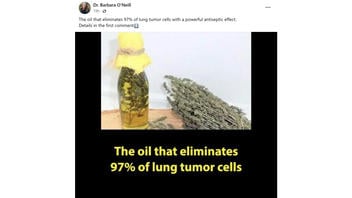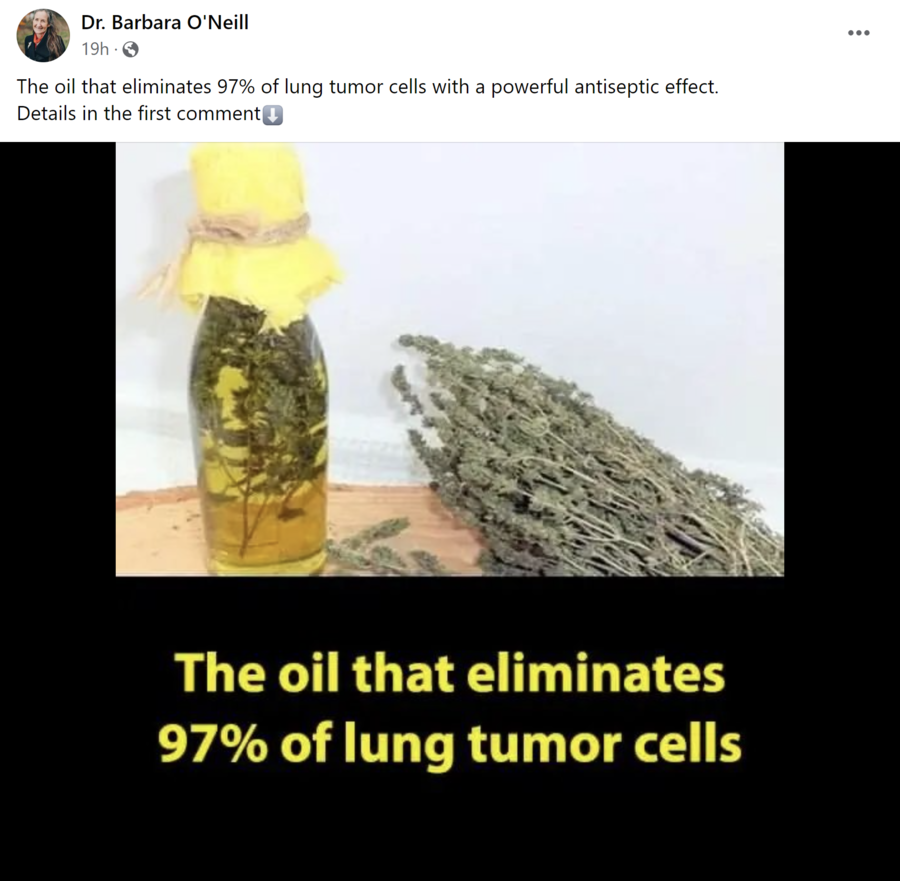
Did controversial naturopath Barbara O'Neill endorse a recipe of thyme oil said to "eliminate 97% of lung tumor cells," as a post on Facebook suggested? No, that's not true: O'Neill is the subject of a fake post on Facebook designed to look as though it belongs to O'Neill. A link in the post's comment section redirects users to an unrelated webpage registered in France that is not affiliated with O'Neill. Included on the linked page was a post that claimed without evidence that recent research "has shown the capacity of thyme oil to inhibit the development of lung cancer cells" and that "thyme oil has the potential to be an effective therapeutic agent in the treatment of lung cancer."
The claim originated in a post shared on Facebook on April 27, 2024 (archived here). It featured an image of thyme placed in oil with a text overlay that reads, "The oil that eliminates 97% of lung tumor cells." A caption that accompanied the post read:
The oil that eliminates 97% of lung tumor cells with a powerful antiseptic effect.
Details in the first comment
Below is how the post appeared at the time of this publication:
(Source: Facebook screenshot taken Sun April 28 07:52:00 UTC 2024)
As Lead Stories previously reported, the Facebook page that shared the post above is not affiliated with O'Neill. Instead, it is categorized as a "Fan Page" in its "About" section (archive). According to the page transparency information, the page was created on September 5, 2023, under "Dr Barbara o Neil" and renamed "Dr. Barbara O'Neill" on November 16, 2023. As of this publication, the page manager was located in Morocco, and it was stated that the "person or group responsible for this Page hasn't completed our verification process yet."
In the post's comments section, a link (archived here) led to the webpage Tasty Recipes, on boppybloom.com, which did not declare any affiliation with O'Neill. It included a recipe for thyme oil's potential to "kill 97% of lung tumor cells." It read, in part:
Thyme oil, a powerful natural treatment that is well-known for its powerful antiseptic properties, has showed the potential to kill 97% of lung tumor cells, which has garnered the attention of researchers and the medical community all over the world...
There has been significant advancement in the field of natural alternative medicines as a result of recent research that has shown the capacity of thyme oil to inhibit the development of lung cancer cells.
It was published in a specialist publication that the injection of thyme oil resulted in the eradication of lung tumor cells in laboratory mice by a percentage of 97%. This finding suggests that there is a viable avenue for less intrusive therapies in the battle against lung cancer...
In conclusion, thyme oil has the potential to be an effective therapeutic agent in the treatment of lung cancer, in addition to possessing powerful antibacterial properties that may be used for respiratory disorders. Nevertheless, it is essential to do extensive study in order to completely comprehend its potential and processes, which will allow for the integration of it into medical procedures in a manner that is both safe and successful.
According to the domain search engine Whoxy, which provides backend information about websites, boppybloom.com was registered (archived here) to an unknown entity in France at the time of this publication. The page was first registered on January 25, 2024, to at least two other entities: PERFECT PRIVACY, LLC in the U.S. and Kenji Hiraiwa of GMO DigiRock, Inc. in Japan. The website hosts dozens of recipes and supposed cures that include advertisements in many of the posts.
This lack of transparency in ownership and efforts at redirecting to irrelevant pages indicate the likelihood that this content was created under the pretense of pushing online scams.
Finally, neither the post on Facebook nor the recipe on the linked website provided credible evidence that thyme oil can "eliminate 97% of lung tumor cells," as the post suggested. The post referenced "thymol," described in research from 2022 (archived here) as one of the "major components of thyme oil." The study found that Wister rats administered with thyme oil and thymol exhibited characteristics associated with anticancer properties. However, the publisher retracted the study (archived here) because the "peer-review process of [the] article has been compromised."
Researchers have identified thyme as a potential anticancer agent, but further research is needed to determine whether there is enough evidence to suggest it could treat cancer or tumors.
For example, thyme essential oil was demonstrated by researchers (archived here) in 2021 as suppressing growth and promoting the death of some cancer cells. However, these findings were conducted in in vitro, or laboratory, settings -- not in people. Furthermore, the study primarily determined whether the use of brine shrimp was an adequate method for testing preliminary toxicity in tumor cell lines and tested whether this methodology found similar results to previous studies. As the researchers noted, "a further investigation is needed in order to estimate the anticancer potential of thyme essential oil."
As Lead Stories has previously reported, O'Neill was permanently prohibited by the New South Wales Health Care Complaints Commission (HCCC) in 2019 from practicing any form of health care after an investigation concluded that her spread of misinformation breached New South Wales, Australia's Code of Conduct for Unregistered Practitioners. In a news release published on September 24, 2019, HCCC stated that O'Neill made "dubious and dangerous health claims" that were "not evidence based or supported by mainstream medicine."
Lead Stories has debunked other claims related to O'Neill, which can be read here.


















